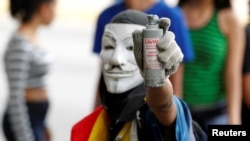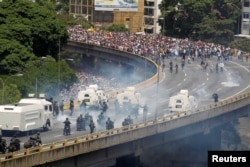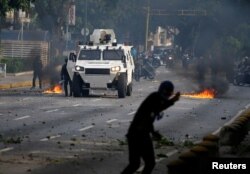Thousands of Venezuelans poured into the main streets of Caracas on Wednesday, with rival camps demonstrating support for and against President Nicolas Maduro and his socialist policies.
Two Venezuelan students and a National Guard sergeant died after being shot during protests, according to Reuters.
The deaths mean eight people have now been killed during protests in Venezuela this month.
U.S. response
In Washington, administration officials are worried the Venezuela government is working to suppress the opposition.
"We are concerned that the government of Maduro is violating its own constitution and is not allowing the opposition to have their voices heard, nor allowing them to organize in a way that expresses the views of the Venezuelan people," U.S. Secretary of State Rex Tillerson said Wednesday at the State Department.
"We are concerned about that situation. We're watching it closely and working with others, particularly through the OAS [Organization of American States] to communicate those concerns to them," Tillerson added in a brief press conference.
One protester, Helma Mendoza, said she joined "the mother of all marches," organized by leaders of the center-right political opposition, because of Venezuela's tattered economy and the resulting strain on her family and the broader society.
"I am motivated by the hunger that we are going through … [and] for those who are dying in hospitals for lack of medicines," she told VOA.
"We are living in a dictatorship, we are living in oppression," opposition protester Karina Ivone said. "This cheating government has betrayed us, the people, the children in the family."
But Yoneici Paredes, a youth leader supporting Maduro, took a different view: "Today, this youth is convinced that socialism is the way … for us to build Venezuela's power and the message is to contribute our grain of sand to be a better country in Venezuela."
Counter march
Maduro rallied his supporters to participate in a counter march, and thousands turned out Wednesday wearing red clothing that marked them as Chavistas.
"Today, the entire Venezuelan population comes out to ratify its support for the Bolivian revolution" and its "loyalty to supreme commander Hugo Chavez," one man in a red cap and T-shirt told VOA.
Chavez launched the leftist movement carried on by Maduro, who succeeded him as president in 2013.
In recent protests, security forces have fired rubber bullets and tear gas, as well as using a water cannon.
The demonstrations erupted after the Venezuelan Supreme Court's March 30 announcement that it would strip the opposition-controlled National Assembly of its legislative powers. The court — stacked with appointees of Maduro and Chavez — reversed its position in the wake of domestic and international outcries about an attempted power grab.
Maduro's opponents converged Wednesday on central Caracas to pressure his administration to respect the assembly's autonomy, schedule long-delayed elections, free political prisoners and restore other democratic norms.
Unidad Venezuela, a coalition of opposition parties, also organized marches in each of the country's 24 states. In addition, a demonstration took place at the Venezuelan embassy in Washington.
Economic pressures
The National Socialist Party has ruled Venezuela for 17 years. Economic pressures have mounted in recent years, especially since the price of oil — Venezuela's chief export — began falling in 2014. Venezuelans face chronic, severe shortages of food, medicine and other basics in what once was Latin America's wealthiest country.
Wednesday's mass protest fell on a significant date for Venezuelans: On April 19, 1810, Venezuelans began their quest for independence from Spain.
In recent days, Maduro ordered troops to fan out around the country on high alert, and he encouraged his backers, including civilian militia members, to defend against alleged plans to overthrow his government.
"Do not hesitate for a second," he urged Monday.
The U.S. State Department issued a statement Tuesday warning that the "international community" would join in any Venezuelan response to the "criminal repression of peaceful democratic activity."
The statement, by spokesman Mark Toner, urged nonviolent demonstrations. "We deplore the use of violence against unarmed protestors," it said.
Maduro rejected the statement, saying the State Department had, in essence, announced a coup against Venezuela. "Whoever wants to see the script written to generate violence, death … read the statement. There is the plan," he said.
On Monday, 11 Latin American countries, including Brazil, Argentina and Mexico, called on Venezuela's government to respect the constitutional right to peaceful protest.
On Tuesday, the Venezuelan Penal Forum, a nongovernmental organization, said security forces in the country have carried out 538 arrests since early April. It said that as of Monday, 241 people were being detained. It also reported multiple instances of torture and cruelty to detainees.
VOA’s Nike Ching from the State Department contributed to this report.






